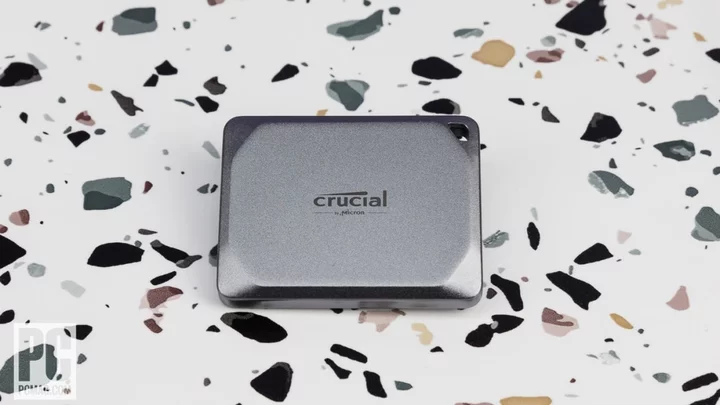The Crucial X9 Pro (starts at $89.99; $129.99 for 2TB as tested) has most everything users might look for in an external SSD: a compact and lightweight frame that's also sturdy, capacities up to 4TB, 256-bit hardware-based encryption, and good benchmark results. While the X9 Pro lacks the raw speed of the Editors' Choice-winning Crucial X10 Pro, which is geared to videographers and creative types, it doesn't require special hardware to get the most out of it, and it comes in at a lower price. That makes it a better choice for most users, and it earns its own Editors' Choice award as a general-purpose solid-state drive.
The Design: Tiny, Featherweight, and Sturdy
Measuring just 0.3 by 2.6 by 2 inches (HWD) and weighing a mere 1.5 ounces, the rectangular, matte-gray X9 Pro is made from anodized aluminum with a black, rubberized base. Its simple yet appealing design includes beveled corners, one of which has a hole through which you can string a lanyard. The drive's status LED indicator is also visible through the hole.
A USB-C port resides in the middle of one of the X9 Pro's short ends, and a very short USB-C-to-USB-C cable is included. The X9 Pro supports USB 3.2 Gen 2, and should be compatible with most any laptop or desktop computer with a USB-C or USB-A port. (For the latter, you'll need a C-to-A adapter plug or cable.) The Crucial X10 Pro supports the faster USB 3.2 Gen 2x2 standard, but to avail yourself of its blazing throughput you will need either a compatible computer (few models, even recent ones, are), or to add a Gen 2x2 expansion card. Check out our USB-C explainer for more on the differences between the USB interfaces.
(Credit: Joseph Maldonado)The X10 Pro comes preformatted in the exFAT file format, and works out of the box with Windows, Mac, Android, iPad, PC, Linux, Xbox, and PlayStation.
The X9 Pro comes in capacities ranging up to 4TB. Many Gen 2 external SSDs, such as the Editors' Choice-winning Samsung Portable SSD T7 Touch and the Samsung Portable SSD T7 Shield, max out at 2TB, while the SK Hynix Beetle X31 is limited to 1TB.
Physical and Data Security
The X9 Pro has some ruggedness cred, with an Ingress Protection (IP) rating of IP55. This indicates that the drive is certified to provide water and dust resistance, although it is not totally impervious to fine dust and its water resistance is limited to being sprayed or splashed with water rather than complete submersion. Some external SSDs, such as the ADATA SE800 with its IP68 rating, are even more ruggedized, providing even better protection from both water and dust. The X9 Pro is also certified drop-proof up to 7.5 feet.
(Credit: Joseph Maldonado)The X9 Pro supports 256-bit AES hardware-based encryption, considered the gold standard among civilian-level data encryption solutions. Micron backs the drive with a five-year warranty, a generous span when many external-drive manufacturers stop at three years.
Testing the Crucial X9 Pro: Above-Par Speed for Everyday Storage
We test external SSDs using PC Labs' Windows 10 storage testbed, a desktop built on an Asus Prime X299 Deluxe motherboard with an Intel Core i9-10980XE Extreme Edition CPU, housed in a SilverStone case. The system has 48GB of DDR4 Corsair Dominator RAM clocked to 3,600MHz, and an Nvidia GeForce GTX 1060 6GB graphics card. We use the motherboard's 10Gbps USB 3.2 Gen 2 port for testing compatible drives such as the Crucial X9 Pro; for Gen 2x2 drives, we test using a 2x2 port added via an Orico PCIe expansion card.
We put the Crucial X9 Pro through our usual suite of external solid-state drive benchmarks, including Crystal DiskMark 6.0, PCMark 10 Storage, BlackMagic's Disk Speed Test, and our own folder transfer test. The first two are run on the PC with the drive formatted in NTFS, and the latter two on an Apple MacBook Pro using exFAT. Crystal DiskMark's sequential speed tests provide a traditional measure of drive throughput, simulating best-case, straight-line transfers of large files. The PCMark 10 Storage test measures an SSD's readiness for a wide variety of everyday tasks.
The X9 Pro's Crystal DiskMark and BlackMagic speed scores were all within the narrow range of scores we see for the vast majority of Gen 2 external SSDs we have tested, and the folder-copy results were also typical. Its PCMark 10 Storage score was above average for a Gen 2 SSD.
Verdict: A Standout External Drive for the Rest of Us
The Crucial X9 Pro is a general-purpose external SSD with no significant shortcomings. (We do wish it included a USB-C-to-A cable or adapter for users who need it, though.) It is lightweight and compact, available in capacities up to 4TB, and produced good scores on all our benchmarks. The X9 Pro provides 256-bit AES hardware-based encryption and some basic ruggedization features, and is backed by Micron's five-year warranty.
It lacks the throughput speed of the Editors' Choice-winning Crucial X10 Pro with its Gen 2x2 interface, but you don't need to buy any extra hardware to get the most out of the X9 Pro, and it comes in at a lower price. (Gen 2x2 ports are rare, in any case.) The Crucial X9 Pro is an excellent all-around external SSD, and earns our Editors' Choice award as such.

